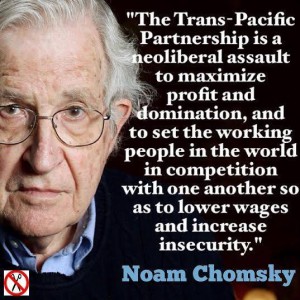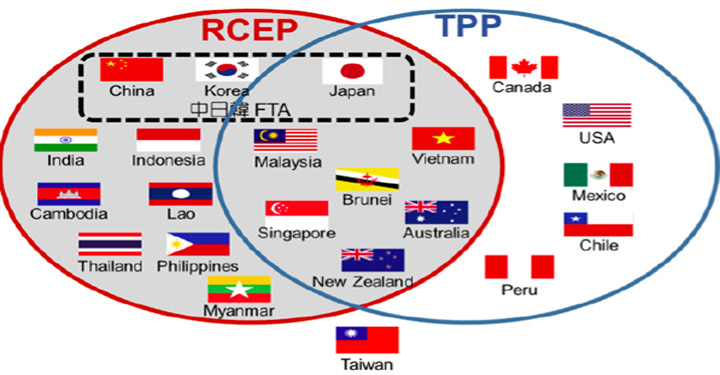The Awareness Party has consistently supported fair trade – 
local, regional, national and international. Our trade and investment treaty policy is determined by our view of the needs of the people of Aotearoa New Zealand including all inhabitants and the environment in which we exist. Our policies are designed to maximise the wellbeing of the nation and all people, as well as promote similar for all people and planet. As such it is critical that we approach trade and investment treaty negotiations with the correct attitude and objectives as our targets to measure the value of any proposed treaty agreement.
The Council of Trade Unions Economist Bill Rosenberg has devoted his February 2017 economic bulletin to the question of appropriate policy to guide trade and investment treaty negotiations to advantage the well-being of the people:
We recommend the summary from Bill Rosenberg at CTU, as his suggestions support making trade negotiations subordinate to domestic policy imperatives similar to The Awareness Party Principles.
Please note however that, since the summary was written, the government has formally ratified the Trans-Pacific Partnership.
Summary
“With the Transpacific Partnership Agreement (TPPA) in its death throes, it is time to think about what a good alternative – and what people-friendly globalisation – would look like.
At the heart of public concerns, whether it is about the impact of these agreements on medicine prices, public health, labour rights, the environment, privacy, the power of overseas investors, migration (less so in New Zealand), food standards, or inequality, is the same debate we constantly have at a national level over different objectives and priorities.
Yet the international agreements are products of the neoliberal framework which is now widely accepted to have failed economically, socially and environmentally. The agreements have extended hugely in scope beyond trade, and their objectives have changed from an arguable basis of maximising economic welfare to a much more extensive one that maximises the most powerful player’s commercial advantage. Their central principles make economic activity primary, rather than wellbeing such as improving living standards, health, human rights, fairness and a clean environment. Aspects of wellbeing (and only some) are recognised only as ‘exceptions’ to the rules that prioritise increased economic activity.
The normal political debate over priorities is turned on its head in a way that serves corporate interests rather than social, environmental and broader economic interests. This form of globalisation – called “hyperglobalisation” by Harvard economist Dani Rodrik because it is so extreme – is incompatible with a sovereign nation state and democracy, and makes it very difficult for social democracy to flourish. Other forms of globalisation are possible.
I suggest that what we should seek as far as possible is consistency between our aims at home and our international aims. Wellbeing should be primary. Agreements should recognise as primary the right of each nation to make rules in its citizens’ interests in certain essential areas. An example is in areas fundamental to their wellbeing including health, education, safety, environment, conservation, culture, human (including labour) rights, and actions it considers necessary to address disadvantage of social groups, inequalities of income and wealth, and inequalities of outcomes.
Within those limits, intentional trade barriers can then be reduced. The process of developing these agreements should be as similar as possible to the development of domestic legislation, with much greater openness and public consultation.
Treaties under negotiation or proposed:
There are a growing number of treaty negotiations entered or proposed by New Zealand’s Trade Ministry (MFAT) Trade Negotiations Division (TND)
RCEP (Regional Comprehensive Economic Partnership) and the TiSA (Trade in Services Agreement), are more than just trade agreements, they are supra-constitutional geopolitical arrangements with legal enforcement. These are large in scope and favour the corporation interest, as the now dead TPPA (Trans Pacific Partnership Agreement) is generally agreed to do. The US formally withdrew from TPPA in writing at the end of January 2017 ensuring the coming into force provisions are not able to be effected. The remaining eleven (11) nations in TPP lite are entering negotiations to see whether they are able to proceed to close an agreement without the US.
(See below for more details on RCEP and TiSA.)
Investment and trade treaties become critical elements of international law binding the respective governments to their arrangements. The question being, ‘do they assist or constrain government action to protect public interest in the nations covered by them?’
We know the commercial enforceability of property rights within the TPPA, TiSA and RCEP, and future investment treaties, will disallow or discourage mitigation of climate change, or economic equity through regulation based on human rights, or precautionary principles, where the investor interest is in conflict with the community or commons interest.
These treaties will negatively impact on New Zealand’s ability to make democratic decisions in the public interest.
The government will be limited in the legislation it can put in place, as it could be sued for millions by transnational corporations in secret off shore ISDS (Investor State Dispute Settlement) tribunals, where any laws passed affected their profit. That is just one of the issues.
Once signed these agreements will be very difficult if not impossible to undo.
For detailed and accurate information on the TPPA, which although signed has not been ratified, go to
It’s Our Future.
The Awareness Party demands that the NZ Government rescinds the TPPA legistation. Further the Party’s policy is that a new treaty examination process be entered for any TPP lite agreement entered into by New Zealand.
Here is the late April 2017 report by Dr Jane Kelsey.
Below is some information about TiSA and RCEP.
The Trade in Services Agreement (TiSA) is a proposed international trade treaty between 23 Parties, including the European Union and the United States. The agreement aims at liberalising the worldwide trade of services such as banking, health care and transport. Criticism about the secrecy of the agreement arose after WikiLeaks released in June 2014 a classified draft of the proposal’s financial services.
The Regional Comprehensive Economic Partnership(RCEP) is currently being negotiated and is just as concerning as the TPPA. This treaty includes China and India but excludes the US. According to Professor Kelsey, they show Japan and South Korea are seeking to export some of the worst parts of the TPPA into RCEP, notably provisions relating to medicines and foreign investors’ rights and enforcement powers.
Back to Policies page

